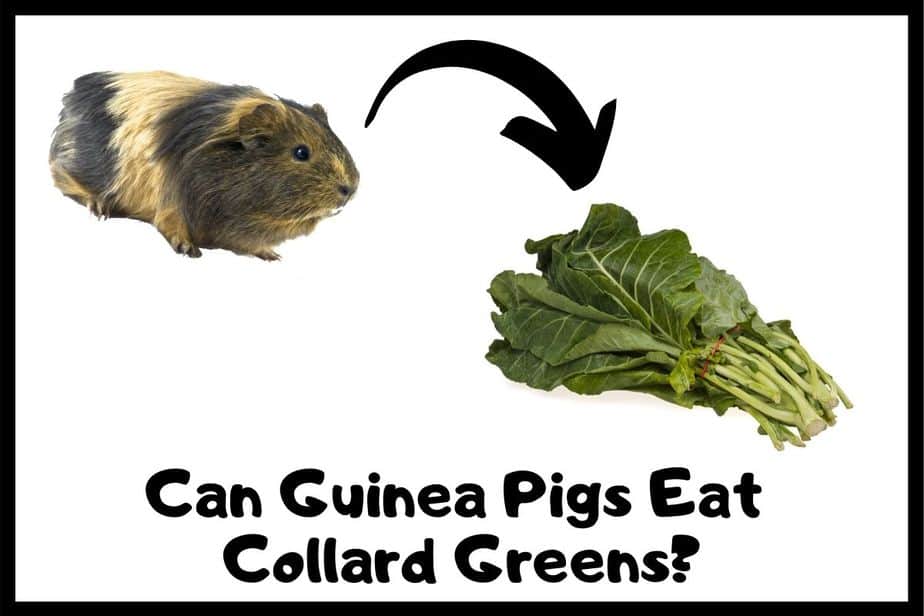Collard greens are Leafy Greens with a wide range of nutrients in it. Rich In Vitamin A, C & K, this amazing vegetable can help prevent a wide range of diseases and improving the lifestyle. But are collard greens ok for our guinea pigs?
Can guinea pigs eat collard greens? Yes, guinea pigs can eat collard green for sure. Collard greens are rich sources of vitamin A, C, & K, followed by a wide range of other nutrients needed by our guinea pigs. However, it also contains a decent amount of calcium; thus, it can be fed sparsely.
Collard greens contain a wide range of nutrients that are needed by our guinea pigs.
However, it also contains certain nutrients like calcium, phosphorous, and oxalic acid that our guinea pigs can’t have too much off.
Thus, it is recommended to monitor the feeding and feed collards on an occasional basis only.
So, now that you know you can feed collards to the guinea pigs, you might want to know the feeding size and frequency.
However, we first need to understand what are the hazards and benefits before moving to the serving size.
Thus, let us begin by understanding the nutritional composition of collard greens.
Nutrition in collard greens?
Source: USDA National Nutrient database
| Nutrients | Amount |
|---|---|
| Vitamin C | 35.3 mg/ 100 g |
| Vitamin K | 437.1 µg/100 g |
| Vitamin A | 251 µg/ 100 g |
| Carotene | 2991 µg/ 100 g |
| Calcium | 232 mg/ 100 g |
| Phosphorous | 25 mg/ 100 g |
| Potassium | 213 mg/ 100 g |
| Fiber | 4 g/ 100 g |
| Sugar | 0.46 g/ 100 g |
| Protein | 3.02 g/ 100 g |
| Carbs | 5.42 g/ 100 g |
| Calories | 32 Kcal |
| Fat | 0.61 g/ 100 g |
| Water | 89.62 g/ 100 g |
- Vitamin C: Collard green is a rich source of Vitamin C for our guinea pigs. Vitamin C plays a lot of vital roles in the body, including strengthening the immune system, prevention of diseases, and formation of collagen, which further helps in the formation and maintenance of blood vessels & bones.
- Vitamin A: Collard green also contains an abundance of Vitamin A in it. It is essential for improving our vision, healthy growth of hair and skin & supporting the immune system.
- Vitamin K: Vitamin K is yet another vitamin that can be found n abundance in collard greens. It is essential for the clotting of blood that further helps in the quick recovery of wounds. It also aids in various other functions of the body.
- Iron: Collard green is also rich in minerals like iron that is needed by the body. A lack of iron in the body can lead to loss of hair and rough skin and coat in our guinea pigs. Iron is also needed during pregnancy and young age for proper growth.
- Magnesium: Magnesium is yet another essential mineral that can be found in collards. It is needed by the body for various functions, including proper functioning of the heart, maintaining the glucose level in the blood, and supporting the immune system of the body.
Are collard greens safe for guinea pigs?
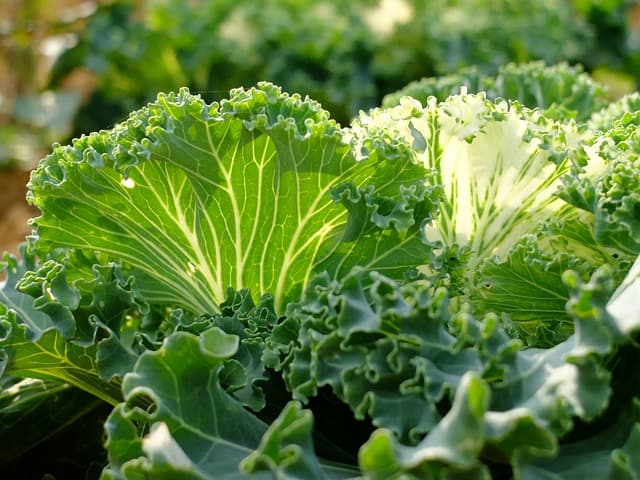
Yes, collard greens are safe for our guinea pigs if fed sparsely. It contains a decent amount of nutrients needed by our guinea pigs.
However, high calcium and oxalate content is one of the major problems for our guinea pigs.
Although most of these problems can be avoided by feeding the right quantity and at the correct intervals.
So, let us first have a look at some of the issues that can arise by overfeeding collards to your guinea pigs.
Formation of bladder stone
Guinea pig’s body doesn’t absorb excess calcium, and thus it binds with the oxalate to form bladder stones in guinea pigs.
A bladder or kidney stone is a common problem diagnosed in pet guinea pigs.
You must make sure you monitor the calcium content in the diet and provide a mix of low calcium veggies with higher calcium veggies to avoid such issues.
You should also avoid feeding vegetables like collards, kale, broccoli, arugula, etc. if your guinea pigs have a medical history of bladder stone or sludge.
Diarrhea:
Diarrhea is another common health issues in guinea pigs. A guinea pig can suffer from diarrhea due to several reasons; however, overfeeding or new food are some significant causes of it.
If you are introducing collards, then make sure you add it slowly. Also, make sure you begin with a small quantity and raise it little by little to make sure your guinea pigs get used to it.
Guinea pigs have a sensitive digestive system, and any significant change in their diet can set if off-balanced. Make sure you keep that in mind while serving them anything.
Bloating:
Bloating is also a health issue diagnosed in guinea pigs. Although it is not life-threatening, it can be stressful for our guinea pigs.
Guinea pigs can develop gas in their digestive tract that can result in bloating.
Some food like cabbage, cauliflower, collards, arugula, etc. can be the cause of bloating in some guinea pigs.
Thus, make sure you lookout for the same while feeding collards to your guinea pigs.
Are collard greens good for guinea pigs?
Yes, collard greens can be beneficial for our guinea pigs if we serve them in moderation. Here are some benefits of feeding collards to your guinea pigs:
Help control blood sugar level:
Studies suggest that collard greens are rich in an enzyme called alpha-lipoic acid.
This enzyme can help reduce the blood sugar level by increasing insulin sensitivity.
Collards also contain a decent amount of magnesium in it.
Magnesium also helps control the blood sugar level and can be a useful element in your guinea pig’s diet.
Adding such nutrients help prevent diabetes problem in guinea pigs.
Prevents cancer:
Green vegetables like collards have sulfur-containing compounds known as glucosinolates.
These compounds have a cancer-preventing ability that can be beneficial for our guinea pig.
Although cancer is a rare disease in guinea pigs; however, some guinea pigs do develop tumors that can lead to cancer if left unchecked.
Thus, adding vegetables like collards is beneficial for our guinea pig’s health.
Help maintain a robust immune system:
Collards are also a rich source of Vitamin A, C & K that helps in strengthening the immune system of the body.
These vitamins play a vital role in keeping our immune system healthy. Thus, make sure you make it a part of your guinea pig’s diet.
Guinea pigs cannot synthesize their own Vitamin C; therefore, they need it in their diet.
Vitamin C also plays a vital role in preventing scurvy in guinea pigs, thus make sure you add it into your guinea pig’s diet.
Improves vision:
Guinea pigs have poor eyesight. Their vision or eyesight deteriorates as they get older, and thus adding food rich in Vitamin A can help aid the vision and slow down the degeneration process for our guinea pig’s eyes.
How often can guinea pigs eat collard greens?
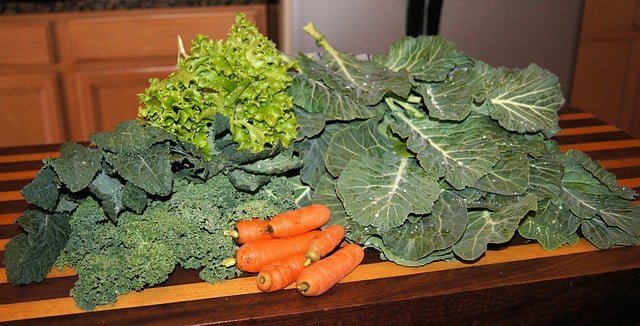
Guinea pigs can eat collard green sparsely as it contains a decent chunk of calcium in it. It would be best if you feed collards only once a week to your guinea pigs.
You can extend it to twice a week while feeding a pregnant or young guinea pigs; otherwise, make sure you don’t go beyond once a week mark.
It is also recommended to mix it with other low calcium veggies like lettuce, bell peppers, cucumber, zucchini, carrots, etc. to create a healthy and balanced diet for your guinea pigs.
Always make sure to feed it occasionally and never make it a part of their daily diet. Occasional feeding can help eliminate the health issues that we discussed earlier in this article.
How much collard greens can guinea pigs eat?
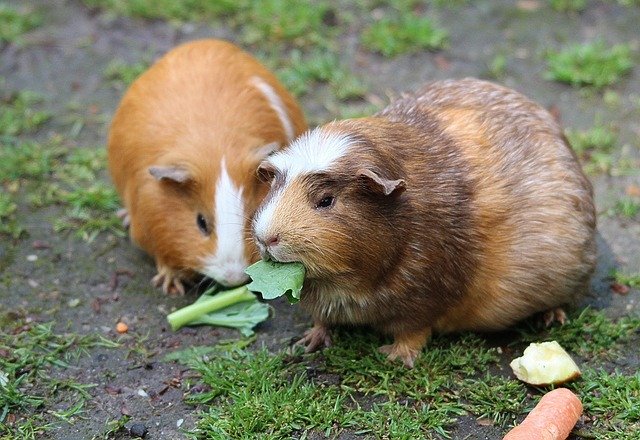
It is recommended to feed only a small leaf of collard green to your guinea pigs at a time.
Feeding small quantities helps eliminate possible health issues as the calcium that goes into your guinea pig’s diet gets limited.
You can always mix it with low calcium veggies to make a completely balanced meal for your guinea pigs.
Can guinea pigs eat collard greens stems?
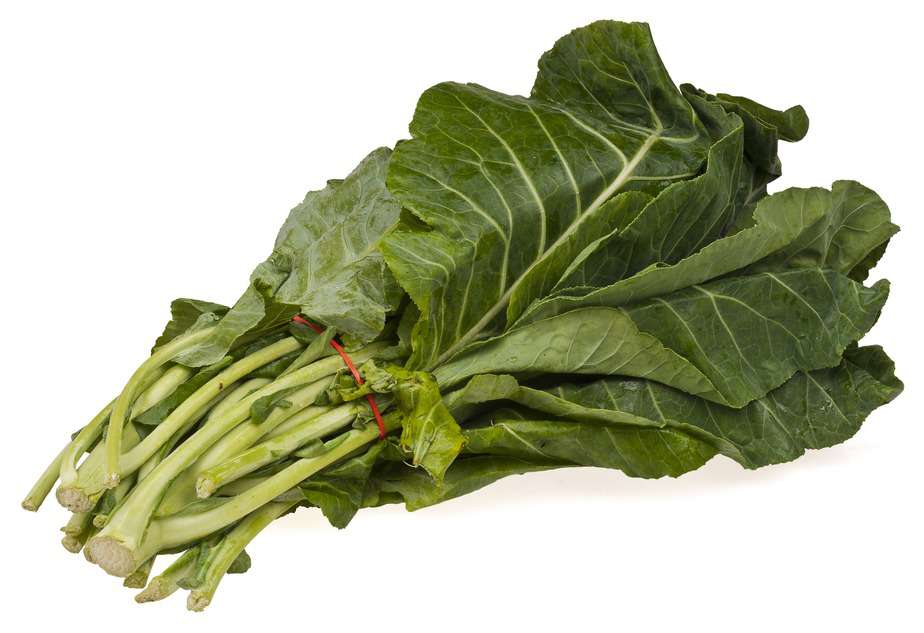
Yes, guinea pigs can eat collard greens stems but only in moderation.
The stems of collards also contain a decent amount of calcium in it; thus, you should limit the serving.
It would be ideal to throw a leaf along with the stalk while feeding them collards.
However, please don’t throw in some collard stalks whenever you feel like as it can be bad for our guinea pigs.
Can guinea pigs eat cooked collard greens?
No, Guinea pigs cannot eat cooked collards. Cooked food is not suitable for our guinea pig’s digestive system as they cannot digest the food well.
The other ingredients added to the food while cooking is also not ideal for our guinea pigs; thus, it is best to avoid cooked collards entirely.
Can guinea pigs eat canned collard green?
No, guinea pigs cannot eat canned collards at all.
The canning process required the addition of additional chemicals for increasing the shelf like of the product, and those chemicals are harmful to our guinea pigs.
Thus, it is best to avoid canned collard greens.
How to prepare a collard green for your cavies?
Preparing collards for your guinea pigs can be simple and straightforward. Here are the steps you need to follow:
- Get fresh and organic collard green for your guinea pigs. Avoid any wilting vegetables as it can be bad for your guinea pig’s health.
- The second step is to soak the collards in some cold water to get rid of dirt and chemicals trapped in the leaves. Once done, you can use a salad spinner to dry it off or let them dry in a kitchen towel while you prepare other veggies.
- The next step is optional, and that is cutting the stalks and getting rid of the same. You can also choose to serve the collards along with its stem if you want to.
- The next step is to mix it with other veggies and make a healthy and complete vegetable bowl for your guinea pigs.
- Remember to remove any uneaten vegetables from the cage. Uneaten fruits and vegetables are often the hotspots for bacterial bloom. It also attracts flies and rats towards your guinea pigs.
Pro tip: You can also prepare the vegetable for a few days or a few serving at a time and use proper quality vegetable storage contains for keeping the same fresh and ready.
Conclusion: Guinea pigs and Collard green
- Collard green is rich in Vitamin A, Vitamin K, Vitamin C, and other essential nutrients like magnesium & iron that is needed by our guinea pigs.
- Can guinea pigs eat collard greens? Yes, guinea pigs can eat collard green but only in moderation.
- Limit the serving of collards to once a week only. Sparse feeding is helpful to avoid health issues in guinea pigs.
- Serve no more than a small leaf of collards to your guinea pigs at a time.
- Formation of stone & Sludge, Diarrhea & Bloating can be some health issues due to overfeeding collard greens to our guinea pigs.
- Make sure you mix the collards with other low calcium veggies to create a well-balanced diet for your guinea pigs.
Sources: Collard greens, Diet Composition and Mineral Balance in Guinea Pigs, Dietary Vitamin C, and Vitamin E on Guinea Pig Immune Responses to Mitogens, Vitamin C requirements of the guinea-pig, Is Your Guinea Pig’s Diet Providing the Right Nutrients? Care of Guinea Pigs.
